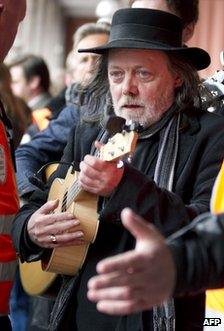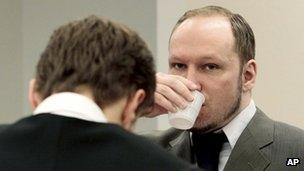Breivik trial: Norwegians rally around peace song
- Published
Thousands gathered in Oslo to sing the song, including singer Lillebjoern Nilsen
Some 40,000 people have gathered on an Oslo square to sing a popular peace song which mass killer Anders Behring Breivik condemned at his trial.
The right-wing extremist had accused the singer of Children Of The Rainbow, Lillebjoern Nilsen, of being a Marxist who sought to brainwash children.
Nilsen led the crowd on Thursday in singing the song on Youngstorget Square, close to the courthouse.
Inside, the trial heard testimony from survivors of the Oslo bomb attack.
It is the ninth day of Breivik's trial for the killing of eight people in Oslo and 69 on the island of Utoeya, as well as the wounding of more than 200 others.
He admits the attacks on 22 July last year but denies guilt or insanity.
The five-strong panel of judges at Breivik's trial will make a ruling on his sanity at the verdict in July.
Breivik may eventually face a term of 21 years in jail, which could be extended if he is thought to be a continuing danger to society.
He says he launched his attacks to defend Norway from multiculturalism, and Muslim immigration in particular.
Song event

Lillebjoern Nilsen led the crowd
In court last Friday, Breivik attacked Norway's educational system and singled out Nilsen as a "good example of a Marxist who infiltrated the cultural sector, [who] writes music that is used to brainwash children".
On Thursday, Nilsen led the singing in the square of Children Of The Rainbow, a Norwegian version of US folk singer Pete Seeger's My Rainbow Race, which is an anti-war song from his 1973 album of the same name.
Standing under umbrellas in the rain, the crowd sang both the Norwegian and English versions of the song.
Its lyrics include the lines: "Some want to take the easy way/Poisons, bombs! They think we need 'em./Don't they know you can't kill all the unbelievers./There's no shortcut to freedom."
People also gathered in other Norwegian towns to perform the song, with the event promoted on social media.
"I grew up with this song and have sung it to my child," said Lill Hjoennevaag, one of the organisers of the demonstration.
"Everybody I know feels strongly about this song and we need to take it back," she told Norwegian public broadcaster NRK.
Singers later headed to the courthouse where the trial was under way, to attach flowers to the security barriers.
"Hopefully they can all hear the song inside," Oslo blogger Fredrik Giertsen told the BBC News website.
Ragnhild Holmas, another Oslo blogger who joined the singers, remembered the mass anti-violence rallies that followed the 22 July killings.
"Glad to see that the love from last summer wasn't just a one-time thing," she told the BBC News website.
While the song might be Utopian, she said, "the message is far from cheesy. Breivik thinks we're brainwashed anyway, but it's important to show our distance."
Battle to recover
Harald Fosker had to have surgery on his face as a result of the blast in the government quarter, which killed eight people and injured 209 others.
Testifying on Thursday, the justice ministry employee described the impact of the explosion: "I only remember spitting out teeth.
"The shock was so great that I did not feel pain there and then. That came the next day."
The trial heard in detail of the numerous operations he underwent as surgeons rebuilt his face and worked to restore his hearing and vision.
He is now back at work part-time and hopes to be fully employed again in time for the first anniversary of the bombing.
Breivik listened expressionless as the court heard other harrowing accounts of the impact of the blast, correspondents say.
Anne Helene Lund, 24, was just 7m (23ft) from the explosion, which left her in a coma for a month.

Breivik denies he is insane
When she woke up she had lost her memory, unable to even remember the names of her parents.
Her father, Jan Erik Lund, fighting back tears, described seeing his daughter injured in hospital: "It was like experiencing the worst and the best in the same moment.
"It was fantastic that she was alive, horrible that she was as injured as she was."